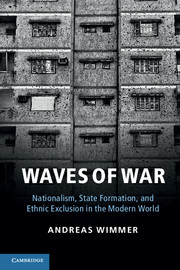4 - Nation-state formation and war
Published online by Cambridge University Press: 05 January 2013
Summary
“Events of the recent past have once again clearly demonstrated that the world is not yet ready for perpetual peace” (Hintze 1975: 215). This sarcastic statement is as true today as it was when penned 100 years ago by Otto Hintze in what is perhaps the first systematic treatise on warfare in the social sciences. In the meantime, a vast literature on why and when wars are more likely to break out has emerged. As briefly discussed in the introduction, this literature largely overlooks that nationalism and the global spread of the nation-state might represent major causes of war. This chapter seeks to correct this omission by showing that both wars between and within states are most likely to be fought during and because of the process of nation-state formation.
Blind spots in conventional studies of war
The existing literature in international relations started from a different angle, however: from the basic insight that the world is not governed by a global state, but divided into competing sovereign entities. This anarchic structure makes wars between states a recurrent feature of global history. Decades of debate ensued to determine which exact distribution of military power between states and which features of their internal decision-making processes will make war more likely. Is a bipolar system such as during the Cold War more war-prone than a multipolar system (Waltz 1979)? Are global wars breaking out every time a new state rises to global dominance (Organski and Kugler 1980)? Will security-maximizing states always attack each other when they have the military upper hand (Mearsheimer 2001) or only when offensive military doctrines and technologies dominate over defensive ones (Van Evera 1999)? Are states with a long and persistent history of saber rattling and competition, such as between India and Pakistan, more likely to fight each other on the battlefield (Diehl and Goertz 2000)? What issues over which states compete are more likely to lead them into war (Senese and Vasquez 2008) and which types of informational asymmetries or commitment problems make the costly pursuit of war more attractive than a bargained solution (Fearon 1995)? Can international norms and institutions (Keohane 1984) or intense trade between countries (Polachek 1980) countervail the consequences of anarchy and prevent war? What kind of domestic coalitions of actors can succeed in pushing for expansionist wars and how do they manage to rally the population behind them (Snyder 1991)? And relatedly: why are democratic states not fighting other democracies (Russet 1993)?
- Type
- Chapter
- Information
- Waves of WarNationalism, State Formation, and Ethnic Exclusion in the Modern World, pp. 108 - 142Publisher: Cambridge University PressPrint publication year: 2012



